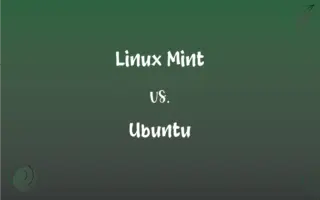Relational Algebra vs. Relational Calculus: What's the Difference?
Edited by Aimie Carlson || By Harlon Moss || Published on February 13, 2024
Relational algebra is a procedural query language for databases, focusing on how to obtain the result, while relational calculus is a non-procedural, declarative language, focusing on what results to obtain.

Key Differences
Relational algebra is a procedural query language, meaning it defines a sequence of operations to process the query. Relational calculus, in contrast, is non-procedural, specifying the requirements for the result without stating the specific operations to achieve it.
In relational algebra, queries are composed of a set of operations, like selection, projection, and join. These operations tell the database exactly how to retrieve data. Relational calculus, however, uses expressions to denote the desired properties of the result set, leaving the actual query processing to the database's internal mechanisms.
SQL, a widely used database query language, is based on concepts from both relational algebra and relational calculus. Relational algebra influences the operational aspect of SQL, while relational calculus contributes to the declarative nature of SQL queries.
Relational algebra's procedural nature makes it relatively straightforward for understanding the steps in query processing. Relational calculus, being declarative, is often more abstract and can be less intuitive in terms of understanding the underlying data retrieval processes.
Database systems utilize relational algebra to optimize and execute queries. Relational calculus, being more abstract, is primarily used in the theoretical foundation and design of database query languages.
ADVERTISEMENT
Comparison Chart
Query Language Type
Procedural
Non-procedural
Focus
How to obtain results
What results to obtain
Operations
Set of specific operations like join, select
Expressions specifying properties of result set
Understanding and Use
More straightforward and operational
More abstract and declarative
Role in Database Systems
Directly used in query processing and optimization
Theoretical foundation for query languages
ADVERTISEMENT
Relational Algebra and Relational Calculus Definitions
Relational Algebra
Defines the steps to execute queries.
Using projection in relational algebra specifies columns in the result.
Relational Calculus
Provides a theoretical basis for SQL.
SQL's WHERE clause is influenced by relational calculus.
Relational Algebra
Influences operational aspects of SQL.
SQL's SELECT statement is based on relational algebra's projection.
Relational Calculus
Focuses on what to retrieve, not how.
Relational calculus allows stating the criteria without specifying the procedure.
Relational Algebra
Involves operations like union, intersection.
The union in relational algebra combines two tables.
Relational Calculus
More abstract in specifying queries.
Query formulation in relational calculus is more about the 'what' than the 'how'.
Relational Algebra
Aids in optimizing database queries.
Optimizing a query involves restructuring relational algebra operations.
Relational Calculus
Uses expressions to specify result set properties.
Relational calculus is used to express the desired characteristics of the result set.
Relational Algebra
Used for specific data retrieval processes.
A join operation in relational algebra merges related tables.
Relational Calculus
Specifies conditions for data retrieval.
In relational calculus, you declare the properties of the data you need.
FAQs
What does relational calculus focus on?
Relational calculus focuses on what results the query should return.
How does relational calculus specify queries?
It uses expressions to specify the desired properties of the result set.
Is relational algebra procedural or non-procedural?
Relational algebra is procedural.
Can relational algebra operations be combined?
Yes, operations like join and selection can be combined.
What are some common operations in relational algebra?
Selection, projection, and join are common.
What is relational algebra?
Relational algebra is a procedural query language used in databases.
Does relational calculus directly influence SQL?
Yes, particularly in the declarative aspect of SQL queries.
How abstract is relational calculus?
It is more abstract compared to relational algebra.
Is relational calculus practical for query execution?
It's more theoretical and less about practical execution.
Is relational algebra easy to optimize?
Yes, due to its procedural nature.
Can relational algebra handle complex queries?
Yes, by combining different operations.
What role does relational calculus play in database theory?
It provides a theoretical foundation for query languages.
Does relational calculus involve direct data manipulation?
No, it focuses on specifying what the results should be like.
Are relational calculus expressions direct instructions?
No, they specify requirements, not direct instructions.
Does relational calculus allow for flexibility in querying?
Yes, it offers flexibility by specifying desired outcomes.
What makes relational algebra straightforward?
Its step-by-step procedural approach.
Is knowledge of relational algebra essential for SQL?
Understanding its concepts helps in better SQL query formulation.
Do database systems use relational algebra?
Yes, for query processing and optimization.
How does relational algebra aid in data retrieval?
It defines specific steps to retrieve data.
How does relational calculus contribute to SQL's WHERE clause?
It influences the way conditions are specified in the clause.
About Author
Written by
Harlon MossHarlon is a seasoned quality moderator and accomplished content writer for Difference Wiki. An alumnus of the prestigious University of California, he earned his degree in Computer Science. Leveraging his academic background, Harlon brings a meticulous and informed perspective to his work, ensuring content accuracy and excellence.
Edited by
Aimie CarlsonAimie Carlson, holding a master's degree in English literature, is a fervent English language enthusiast. She lends her writing talents to Difference Wiki, a prominent website that specializes in comparisons, offering readers insightful analyses that both captivate and inform.







































































